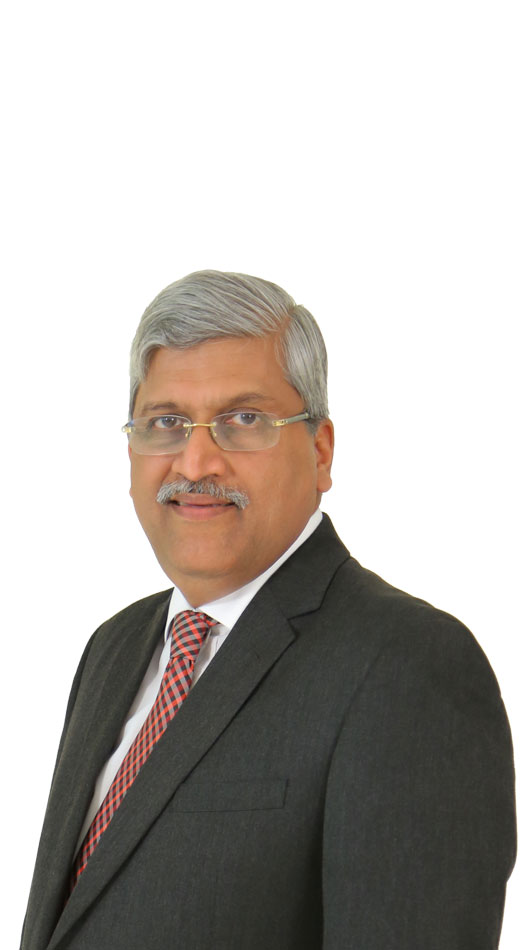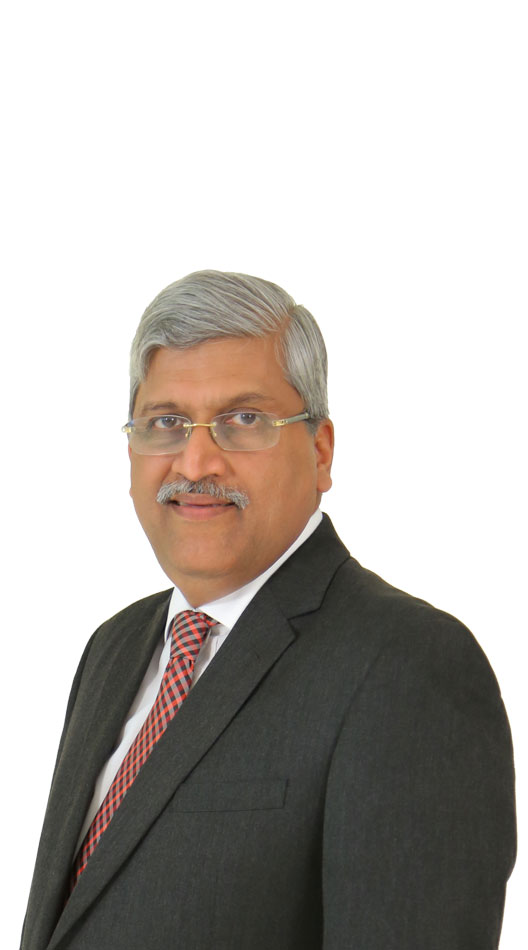
 Vimal Kejriwal, Managing Director & CEO,
Vimal Kejriwal, Managing Director & CEO,KEC International
Spotlight
Transmitting positivity, together
The Grid speaks to Vimal Kejriwal, Managing Director & CEO, KEC International, to learn about its plans to partner Sterlite Power in the common quest to deliver reliable power to all
1. Please tell us about KEC's partnership with Sterlite Power.
KEC International is a global leader in Engineering, Procurement, and Construction (EPC), specialising in power transmission, distribution, railways, civil, urban infrastructure, solar, smart infrastructure, and cables. We have more than seven decades of experience in building some of the most iconic and complex power infrastructure projects in the world.
Our association with Sterlite Power began in 2012 with the Aurangabad-Dhule transmission project, where together we constructed 765kV and 400kV transmission lines from Aurangabad to Dhule and Dhule to Vadodara, respectively. Since then, we have successfully partnered with Sterlite Power to construct more than five power infrastructure projects in India.
Recently, we concluded the Gurgaon-Palwal Transmission project, wherein we executed five 400kV transmission lines that are helping to deliver ~2000 MW of power across Rajasthan, UP and Haryana. Currently, we are also executing the 765 kV and 400 kV transmission lines associated with Khargone Transmission Ltd. Project.
KEC has also played a strategic role in Sterlite Power's entry into the Brazilian market. SAE Towers, our wholly-owned subsidiary in Brazil, is currently executing the 500kV Borborema transmission line in the country, for Sterlite Power.
2. What are the significant synergies that you are achieving through your partnership with Sterlite Power?
Developing power transmission infrastructure in India is a complex activity, especially in the development phase. Transmission projects are linear in nature and cut across different regions and geographies. It is, therefore, important to have a partner who understands the complexities and challenges associated with the construction of such mammoth assets.
Sterlite Power has a strong track record of executing some of the toughest and most challenging transmission projects in the country. Their focus on innovation and the highest level of quality, safety and environmental standards has been a pioneering differentiator. Over the years, our partnership with Sterlite has grown from strength to strength, and we are confident of the value that both partners will derive in the long term through this association.
3. What are the focus areas for KEC India in the power transmission space going forward?
Being a leader in India's transmission and distribution space, KEC has been continuously developing responsible and sustainable EPC capabilities. On the project execution front, there is an enhanced focus on digitalisation and mechanisation to help improve productivity and expedite project progress. Various innovative mechanised construction methods are adopted, that include line stringing through drones and tower erection using boom cranes, and optimising tower designs by using optimal amount of steel and other metals. To overcome the limitations of manual surveys, surveys are being carried out through drones to predict accurate terrain conditions and minimum ground clearance in transmission line projects. We have also embarked on virtual tower inspections for various clients.
With the Central Government's relentless focus on 'Power for All', KEC is particularly focusing on inter-state transmission projects for enhancing its footprint across the states on a selective basis. On the distribution front, owing to land bank issues across the country and the rising demand for technologically advanced sub-stations, KEC is striving towards enhancing its prowess in GIS (gas-insulated substations) technology via standalone projects as well as AIS (air-insulated substations) to GIS conversion projects.
KEC has embraced the true spirit of change in both letter and spirit. In the wake of these changes, KEC hopes to provide more efficient and sustainable solutions to meet challenging customer needs and evolving market requirements, with a focus on strong project management and ahead-of-schedule project delivery.
We are also emphasising strongly on the sustainability and ESG (environmental, social and governance) aspects of doing business, which is critical for the long-term resilience and success of an organisation in today's challenging and disruptive world. We are developing a strategic sustainability roadmap to lay down our aspirations and action plan towards conducting our business operations in a newer, sustainable, and responsible manner. It will not only help in creating financial value but also create positive outcomes for our internal and external stakeholders and enhance sustainability actions across the value chain.
4. How do you see the power industry in India evolving?
India's power generation capacity is likely to touch 619GW by the end of 2027, from 382GW in FY21. Development of high-voltage transmission lines and substation infrastructure will, hence, need to keep pace with the generation capacity. It will need setting up of inter-regional grid capacity to ensure seamless flow of power from one region to another.
The Central Government's aggressive focus on renewable expansion plans, from the current 100GW to 275GW by 2027, will require significant development in the transmission sector. Significant focus on urbanisation through government schemes in housing, roads, urban transport and water supply, and driving industrial growth through 'Make in India' and 'Atmanirbhar Bharat' will ensure significant investments in the power sector. The growth will also be led by robust investments in inter-regional transmission capacities and steady investments from various states to augment intra-state networks. Rising private sector participation with a favourable risk-return profile of power transmission projects will also continue to support growth in the transmission sector, as central and state governments continue to award a significant chunk of new projects through the TBCB (tariff-based competitive bidding) route.
In the EPC space, few players can provide end-to-end execution of project capabilities. The transmission EPC industry in India is constantly evolving, with healthy margins and consolidation taking place in the sector. Companies in the space are also adapting and engaging newer construction technologies. More importance is being given to timely execution and the proven track record of the player, rather than aggressive bidding tactics.